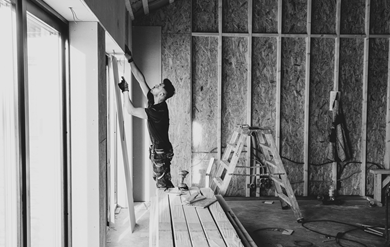The UK construction industry saw a timely boost in activity over the three months to April, with housebuilding leading the charge, according to the latest Glenigan Construction Index.
Residential construction starts climbed 24% quarter-on-quarter and were 22% higher year-on-year, suggesting renewed momentum and confidence in the sector. Glenigan described this rebound as a "sign of resilience despite challenges elsewhere."
In total, the value of underlying projects breaking ground rose 7% compared to the previous quarter, and was up 3% year-on-year, driven predominantly by gains in private and social housing.
Private housing was the strongest performer, with starts jumping 29% year-on-year. Social housing also showed positive movement, recording a 3% annual increase, reflecting a strong seasonal uplift.
However, the picture was less optimistic for the civil engineering sector. Infrastructure and utilities work stalled, with starts dropping 22% both quarterly and annually, signalling continued hesitation in public sector and major project investment.
Allan Wilen, Glenigan’s Economics Director, commented:
“Builders were reporting falling workloads at the end of last year, reflecting a period of real uncertainty across the construction sector. However, the latest figures, particularly in residential, suggest that fortunes may be starting to turn.”
He cautioned, however, that lasting recovery would depend on improved sentiment cascading throughout the industry supply chain.
“The Government’s much-anticipated spending review in June will be a crucial moment. If it brings clarity on major infrastructure investment, it could unlock momentum not just for big-ticket schemes, but the smaller, local projects captured in this data too; the kind councils are waiting to greenlight.”
In a supportive move, the Treasury last month slashed import tariffs on 89 foreign goods, including key building materials. The changes are expected to save construction businesses “at least £17 million a year,” according to government estimates.
Chancellor Rachel Reeves announced that tariffs on products such as plywood and builder’s plastics—"essential for construction"—would be suspended until July 2027.
The tariff cut aligns with the government’s ambition to build 1.5 million new homes over the next five years and is intended to reduce costs for builders and accelerate project delivery.
Source: David Burrows, Mortgage Strategy









